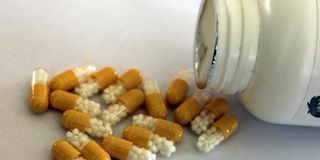HIV-positive children get ‘sweet’ ARVs

A sample of the capsules containing the new pellet formulation of the lopinavir/ritonavir antiretroviral drug, which replaces the syrup formulation. PHOTOS BY LILIAN NAMAGEMBE.
KAMPALA. After receiving numerous cases of children living with HIV/Aids declining to take bitter antiretroviral drugs (ARVs), leading to drug resistance, government has started giving them sugar-coated drugs.
Recent findings by the Ministry of Health indicate that although the national HIV/Aids viral suppression rate is at 91 per cent, children under five years and adolescents have a lower viral suppression rate at 69 per cent.
“The new formulation has been made in form of pellets and the test has been masked,” Dr Cordelia Katureebe, the national coordinator paediatric and adolescent HIV care, told Saturday Monitor.
“We have decided to develop one which can be easily accepted by the children,” she explained.
The new formulation of lopinavir/ritonavir drug prescribed as a second line treatment for children less than 15 years replaces the bitter-tasting syrup formulation of the same drug.
The pellets, sprinkled by the care giver on the food which the child is going to eat unlike the traditional syrup formulation, do not have to be refrigerated.
According to Dr Katureebe, Uganda will start getting supplies by 2017, during the course of the two-year living study which started last month. It is meant to evaluate the use of the new formulation.
The research study spearheaded and funded by the Drugs for Neglected Diseases initiative (DNDi), a Switzerland-based non-profit organisation in collaboration with Ministry of Health, will be carried out in five sites.
A total of 24 children have already been recruited for the study and enrolled on the new formulation.
HIV among children
Drug resistance. According to Ministry of Health, 50 per cent of children living with HIV/Aids, who are started on Nevirapine, a first line treatment, suffer from drug resistance.
HIV prevalence. Uganda has 950,000 children estimated to be HIV-positive, 62,900 of whom are on treatment. Of these, 3,000 are on second line and 48 on third line of treatment. Another estimated 7,000 to 8,000 children who are born with HIV have been exposed to Nevirapine.




